|
|
|
Sort Order |
|
|
|
Items / Page
|
|
|
|
|
|
|
| Srl | Item |
| 1 |
ID:
133428
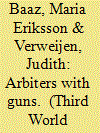

|
|
|
|
|
| Publication |
2014.
|
| Summary/Abstract |
Based on extensive field research in the Democratic Republic of the Congo (DR Congo), this article elucidates the logics, processes and readings surrounding certain 'extra-military' practices enacted by the Congolese army, namely the processing of various types of disputes between civilians. Exceeding the boundaries of the domain of 'public security', such activities are commonly categorised as 'corruption'. Yet such labelling, founded on a supposed clear-cut public-private divide, obscures the underlying processes and logics, in particular the fact that these practices are located on a blurred public-private spectrum and result from both civilian demand and military imposition. Furthermore, popular readings of military involvement in civilian disputes are highly ambiguous, simultaneously representing it as 'abnormal' and 'harmful', and normalising it as 'making sense' - reflecting the militarised institutional environment and the weakness of civilian authorities in the eastern DR Congo. Strengthening these authorities will be vital for reducing this practice, which has an enkindling effect on the dynamics of conflict and violence.
|
|
|
|
|
|
|
|
|
|
|
|
|
|
|
|
| 2 |
ID:
134291
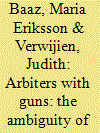

|
|
|
|
|
| Summary/Abstract |
Based on extensive field research in the Democratic Republic of the Congo (DR Congo), this article elucidates the logics, processes and readings surrounding certain ‘extra-military’ practices enacted by the Congolese army, namely the processing of various types of disputes between civilians. Exceeding the boundaries of the domain of ‘public security’, such activities are commonly categorised as ‘corruption’. Yet such labelling, founded on a supposed clear-cut public–private divide, obscures the underlying processes and logics, in particular the fact that these practices are located on a blurred public–private spectrum and result from both civilian demand and military imposition. Furthermore, popular readings of military involvement in civilian disputes are highly ambiguous, simultaneously representing it as ‘abnormal’ and ‘harmful’, and normalising it as ‘making sense’ – reflecting the militarised institutional environment and the weakness of civilian authorities in the eastern DR Congo. Strengthening these authorities will be vital for reducing this practice, which has an enkindling effect on the dynamics of conflict and violence.
|
|
|
|
|
|
|
|
|
|
|
|
|
|
|
|
| 3 |
ID:
157921
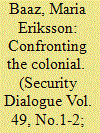

|
|
|
|
|
| Summary/Abstract |
Drawing on postcolonial theory, this article queries into the ways in which the concepts of militarism/militarization and securitization are applied to ‘African’ contexts. We highlight the selective nature of such application and probe into the potential reasons for and effects of this selectiveness, focusing on its signifying work. As we argue, the current selective uses of securitization and militarism/militarization in ‘Africa’ scholarship tend to recreate troublesome distinctions between ‘developed’ versus ‘underdeveloped’ spaces within theory and methodology. In particular, they contribute to the reproduction of familiar colonially scripted imagery of a passive and traditional ‘Africa’, ruled by crude force and somehow devoid of ‘liberal’ ideas and modes of governing. Yet we do not suggest simply discarding ‘selectiveness’ or believe that there are any other easy remedies to the tensions between universalism and particularism in theory application. Recognizing the ambivalent workings of colonial discourse, we rather contend that any attempts to trace the colonial into the present use of the concepts of securitization and militarism/militarization need to acknowledge the problematic nature of both discourses of ‘African’ Otherness and those of universalism and sameness.
|
|
|
|
|
|
|
|
|
|
|
|
|
|
|
|
| 4 |
ID:
124066


|
|
|
|
|
| Publication |
2013.
|
| Summary/Abstract |
This article addresses an underreported aspect of contemporary warring in the Democratic Republic of Congo (DRC): the experiences of women soldiers and officers in the Congolese national armed forces (Forces Armées de la République Démocratique du Congo [FARDC]). It thus addresses an empirical gap in scholarly and policy knowledge about female soldiers in national armies on the African continent, and the DRC in particular. Based on original interviews, the article explores the way female soldiers in the FARDC understand their identities as "women soldiers" and offers new insight into women soldiers' role and responsibilities in the widespread violence committed against civilians in the DRC. Moreover, it explores how their understanding of themselves as "women soldiers" both challenges and confirms familiar notions of the army as a masculine sphere. Such insight is important for better understanding the gendered makeup of the military and for contributing to a knowledge base for Security Sector Reform in this violent (post)conflict setting.
|
|
|
|
|
|
|
|
|
|
|
|
|
|
|
|
| 5 |
ID:
082099


|
|
|
|
|
| Publication |
2008.
|
| Summary/Abstract |
During the last years the DRC has made itself known in the world for terrible acts of violence committed by armed men - militia and the regular army - against the civilian population. The voices of the soldiers and combatants have so far been absent in the accounts of this violence. This silence is problematic, both because it makes it harder to understand such violence, but also because it reinforces stereotypes of African warriors as primitive and anarchic, driven by innate violence and tribal hatred. Enquiry into the particular discursive as well as material circumstances of the armed conflict in the DRC, which might better redress the complex and interrelated context in which 'people in uniforms' commit violence, is consequently impeded. The story we recount here emerges from soldiers within the main perpetrator of violence in the DRC today: the Integrated Armed Forces. The soldiers' interview texts challenge the dominant representation of soldiers and combatants in the DRC. The soldiers made sense of the prevalence of violence (in which they too had participated) in several interrelated ways, none of which reflected any expression of 'natural' (if dormant) violent tendencies, hatred or vengefulness for the enemy.
|
|
|
|
|
|
|
|
|
|
|
|
|
|
|
|
| 6 |
ID:
123503
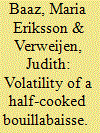

|
|
|
|
|
| Publication |
2013.
|
| Summary/Abstract |
In early 2012, Congolese army deserters formed the M23 rebel movement. This article analyses the insurgency and other armed group activity in the eastern DRC in the light of the politics of rebel-military integration. It argues that military integration processes have fuelled militarization in three main ways. First, by creating incentive structures promoting army desertion and insurgent violence; second, by fuelling inter- and intra-community conflicts; and third, by the further unmaking of an already unmade army. We argue that this is not merely the product of a 'lack of political will' on behalf of the DRC government, but must be understood in the light of the intricacies of Big Man politics and Kinshasa's weak grip over both the fragmented political-military landscape in the east and its own coercive arm. Demonstrating the link between military integration and militarization, the article concludes that these problems arise from the context and implementation of integration, rather than from the principle of military power sharing itself. It thus highlights the crucial agency of political-military entrepreneurs, as shaped by national-level policies, in the production of 'local violence'.
|
|
|
|
|
|
|
|
|
|
|
|
|
|
|
|
| 7 |
ID:
174629
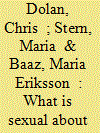

|
|
|
|
|
| Summary/Abstract |
Despite the prominent attention that the problem of conflict-related sexual violence (CRSV) has recently garnered globally, we still know far too little about what is sexual about sexual violence, according to whom, as well as why and how this matters in our efforts to prevent and redress its harms. A growing theoretical, political, legal and ethical imperative to ask questions about the sexual part of sexual violence across both war and peace is nonetheless emerging. This article therefore turns to the accounts of male and female survivors of CRSV at the at the Refugee Law Project (RLP) in Kampala, Uganda. In our reading of their accounts, we explore how the participants understand the possible imbrication of the perpetrator's sexual desire and pleasure with the violence they inflicted, as well as how they deem such intermeshing impossible or deeply problematic in and to the gendered frames that govern how they think about the distinctions between violence and sex, as well as themselves as sexual, social, embodied subjects. Read together, these conflicted and conflicting testimonies offer a vantage point from which to rethink some of the reductive truisms that persist in dominant policy-friendly accounts of wartime sexual violence—namely that such violence is about power and not about ‘sex’. The participants’ accounts thus urge us, as scholars and policy advocates, to resist reducing the multi-layered experiences of victim/survivors of sexual violence to fit into the palatable narratives of victimhood that prevail in humanitarian, juridical and policy spaces.
|
|
|
|
|
|
|
|
|
|
|
|
|
|
|
|
| 8 |
ID:
108445


|
|
|
|
|
| Publication |
2011.
|
| Summary/Abstract |
The global attention focused on sexual violence in the DRC has not only contributed to an image of the Congolese army as a vestige of pre-modern barbarism, populated by rapists, and bearing no resemblance to the world of modern armies; it has also shaped gender and defence reform initiatives. These initiatives have become synonymous with combating sexual violence, reflecting an assumption that the gendered dynamics of the army are already known. Crucial questions such as the 'feminization' of the armed forces are consequently neglected. Based on in-depth interviews with soldiers in the Congolese armed forces, this article analyses the discursive strategies male soldiers employ in relation to the feminization of the army. In the light of the need to reform the military and military masculinities, the article discusses how globalized discourses and practices render the Congolese military a highly globalized sphere. It also highlights the particular and local ways in which military identities are produced through gender, and concludes that a simple inclusion of women in the armed forces in order to render men less violent might not have the pacifying effect intended.
|
|
|
|
|
|
|
|
|
|
|
|
|
|
|
|
| 9 |
ID:
089048
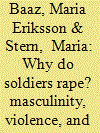

|
|
|
|
|
| Publication |
2009.
|
| Summary/Abstract |
This article explores the ways soldiers in the Congo speak about the massive amount of rape committed by the armed forces in the recent war in the DRC. It focuses on the reasons that the soldiers give to why rape occurs. It discusses how the soldiers distinguish between "lust rapes" and "evil rapes" and argues that their explanations of rape must be understood in relation to notions of different (impossible) masculinities. Ultimately, through reading the soldiers' words, we can glimpse the logics-arguably informed by the increasingly globalized context of soldiering-through which rape becomes possible, and even "normalized" in particular warscapes.
|
|
|
|
|
|
|
|
|
|
|
|
|
|
|
|
|
|
|
|
|